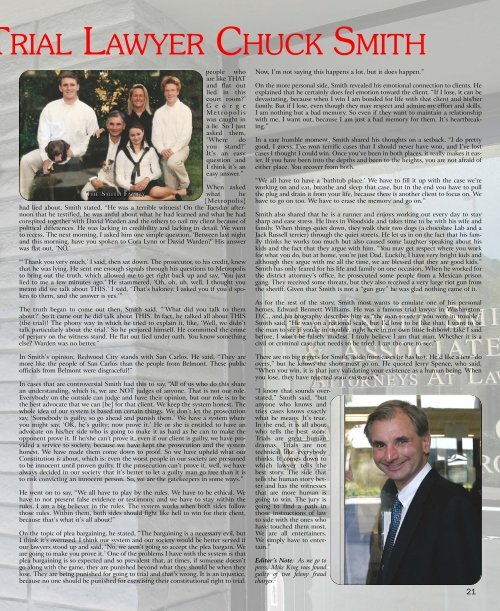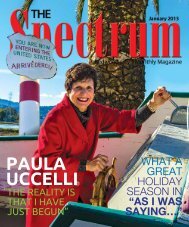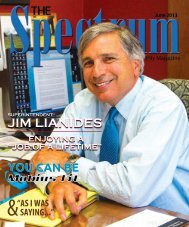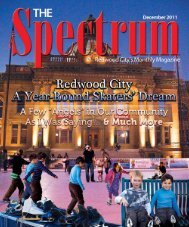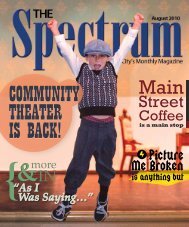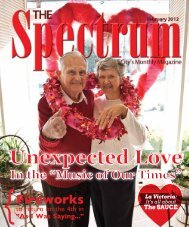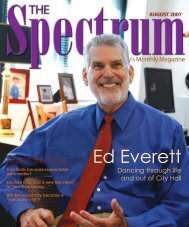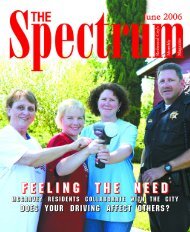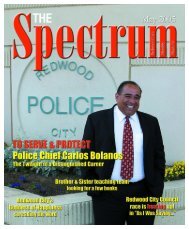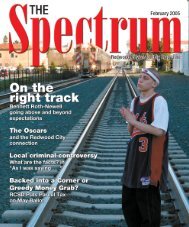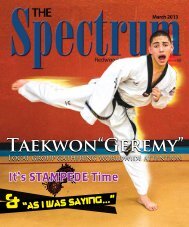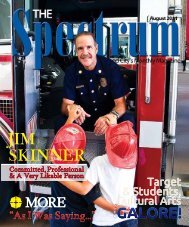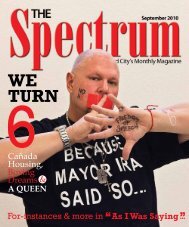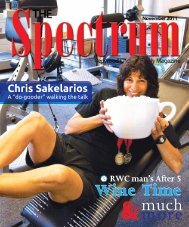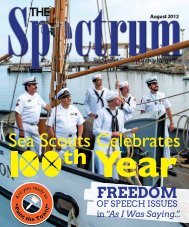CChhhuuuccckkk SSmmmiiittthh - The Spectrum Magazine ...
CChhhuuuccckkk SSmmmiiittthh - The Spectrum Magazine ...
CChhhuuuccckkk SSmmmiiittthh - The Spectrum Magazine ...
Create successful ePaper yourself
Turn your PDF publications into a flip-book with our unique Google optimized e-Paper software.
RIAL LAWYER CHUCK SMITH<br />
people who<br />
are like THAT<br />
and flat out<br />
lied in this<br />
court room?’<br />
G e o r g e<br />
Metropolis<br />
was caught in<br />
a lie. So I just<br />
asked them,<br />
‘Where do<br />
you stand?’<br />
It’s an easy<br />
question and<br />
I think it’s an<br />
easy answer.”<br />
When asked<br />
THE SMITH FAMILY<br />
what he<br />
[Metropolis]<br />
had lied about, Smith stated, “He was a terrible witness! On the Tuesday afternoon<br />
that he testified, he was awful about what he had learned and what he had<br />
conspired together with David Warden and the others to nail my client because of<br />
political differences. He was lacking in credibility and lacking in detail. We went<br />
to recess. <strong>The</strong> next morning, I asked him one simple question, ‘Between last night<br />
and this morning, have you spoken to Cora Lynn or David Warden?’ His answer<br />
was flat out, ‘NO.’<br />
“‘Thank you very much,’ I said, then sat down. <strong>The</strong> prosecutor, to his credit, knew<br />
that he was lying. He sent me enough signals through his questions to Metropolis<br />
to bring out the truth, which allowed me to get right back up and say, ‘You just<br />
lied to me a few minutes ago.’ He stammered, ‘Oh, oh, uh, well, I thought you<br />
meant did we talk about THIS.’ I said, ‘That’s baloney. I asked you if you’d spoken<br />
to them, and the answer is yes.’”<br />
<strong>The</strong> truth began to come out then, Smith said. “‘What did you talk to them<br />
about?’ So it came out he did talk about THIS. In fact, he talked all about THIS<br />
(the trial)! <strong>The</strong> phony way in which he tried to explain it, like, ‘Well, we didn’t<br />
talk particularly about the trial.’ So he perjured himself. He committed the crime<br />
of perjury on the witness stand. He flat out lied under oath. You know something<br />
else? Warden was no better.”<br />
In Smith’s opinion, Redwood City stands with San Carlos. He said, “<strong>The</strong>y are<br />
more like the people of San Carlos than the people from Belmont. <strong>The</strong>se public<br />
officials from Belmont were disgraceful!”<br />
In cases that are controversial Smith had this to say, “All of us who do this share<br />
an understanding, which is, we are NOT judges of anyone. That is not our role.<br />
Everybody on the outside can judge and have their opinion, but our role is to be<br />
the best advocate that we can [be] for that client. We keep the system honest. <strong>The</strong><br />
whole idea of our system is based on certain things. We don’t let the prosecution<br />
say, ‘Somebody is guilty, so go ahead and punish them.’ We have a system where<br />
you might say, ‘OK, he’s guilty; now prove it.’ He or she is entitled to have an<br />
advocate on his/her side who is going to make it as hard as he can to make the<br />
opponent prove it. If he/she can’t prove it, even if our client is guilty, we have provided<br />
a service to society, because we have kept the prosecution and the system<br />
honest. We have made them come down to proof. So we have upheld what our<br />
Constitution is about, which is: even the worst people in our society are presumed<br />
to be innocent until proven guilty. If the prosecution can’t prove it, well, we have<br />
always decided in our society that it’s better to let a guilty man go free than it is<br />
to risk convicting an innocent person. So, we are the gatekeepers in some ways.”<br />
He went on to say, “We all have to play by the rules. We have to be ethical. We<br />
have to not present false evidence or testimony, and we have to stay within the<br />
rules. I am a big believer in the rules. <strong>The</strong> system works when both sides follow<br />
those rules. Within them, both sides should fight like hell to win for their client,<br />
because that’s what it’s all about!”<br />
On the topic of plea bargaining, he stated, “<strong>The</strong> bargaining is a necessary evil, but<br />
I think it’s overused. I think our system and our society would be better served if<br />
our lawyers stood up and said, ‘No, we aren’t going to accept the plea bargain. We<br />
are going to make you prove it.’ One of the problems I have with the system is that<br />
plea bargaining is so expected and so prevalent that, at times, if someone doesn’t<br />
go along with the game, they are punished beyond what they should be when they<br />
lose. <strong>The</strong>y are being punished for going to trial and that’s wrong. It is an injustice,<br />
because no one should be punished for exercising their constitutional right to trial.<br />
Now, I’m not saying this happens a lot, but it does happen.”<br />
On the more personal side, Smith revealed his emotional connection to clients. He<br />
explained that he certainly does feel emotion toward the client. “If I lose, it can be<br />
devastating, because when I win I am bonded for life with that client and his/her<br />
family. But if I lose, even though they may respect and admire my effort and skills,<br />
I am nothing but a bad memory. So even if they want to maintain a relationship<br />
with me, I want out, because I am just a bad memory for them. It’s heartbreaking.”<br />
In a rare humble moment, Smith shared his thoughts on a setback. “I do pretty<br />
good, I guess. I’ve won terrific cases that I should never have won, and I’ve lost<br />
cases I thought I could win. Once you’ve been in both places, it really makes it easier.<br />
If you have been into the depths and been to the heights, you are not afraid of<br />
either place. You recover from both.<br />
“We all have to have a ‘bathtub place.’ We have to fill it up with the case we’re<br />
working on and eat, breathe and sleep that case, but in the end you have to pull<br />
the plug and drain it from your life, because there is another client to focus on. We<br />
have to go on too. We have to erase the memory and go on.”<br />
Smith also shared that he is a runner and enjoys working out every day to stay<br />
sharp and ease stress. He lives in Woodside and takes time to be with his wife and<br />
family. When things quiet down, they walk their two dogs (a chocolate Lab and a<br />
Jack Russell terrier) through the quiet streets. He let us in on the fact that his family<br />
thinks he works too much but also caused some laughter speaking about his<br />
kids and the fact that they argue with him. “You may get respect where you work<br />
for what you do, but at home, you’re just Dad. Luckily, I have very bright kids and<br />
although they argue with me all the time, we are blessed that they are good kids.”<br />
Smith has only feared for his life and family on one occasion. When he worked for<br />
the district attorney’s office, he prosecuted some people from a Mexican prison<br />
gang. <strong>The</strong>y received some threats, but they also received a very large riot gun from<br />
the sheriff. Given that Smith is not a “gun guy” he was glad nothing came of it.<br />
As for the rest of the story, Smith most wants to emulate one of his personal<br />
heroes, Edward Bennett Williams. He was a famous trial lawyer in Washington,<br />
D.C., and his biography describes him as “the man to see if you were in trouble.”<br />
Smith said, “He was on a national scale, but I’d love to be like that. I want to be<br />
the man to see if you’re in trouble, right here in my own little fishbowl. Like I said<br />
before, I won’t be falsely modest. I truly believe I am that man. Whether it is a<br />
civil or criminal case that needs to be tried, I am the one to see.”<br />
<strong>The</strong>re are no big regrets for Smith, aside from cases he has lost. He’d like a few “do<br />
overs,” but he knows the show must go on. He quoted Jerry Spence, who said,<br />
“When you win, it is that jury validating your existence as a human being. When<br />
you lose, they have rejected your existence.”<br />
“I know that sounds overstated,”<br />
Smith said, “but<br />
anyone who knows and<br />
tries cases knows exactly<br />
what he means. It’s true.<br />
In the end, it is all about<br />
who tells the best story.<br />
Trials are great human<br />
dramas. Trials are not<br />
technical like everybody<br />
thinks. It comes down to<br />
which lawyer tells the<br />
best story. <strong>The</strong> side that<br />
tells the human story better<br />
and has the witnesses<br />
that are more human is<br />
going to win. <strong>The</strong> jury is<br />
going to find a path in<br />
those instructions of law<br />
to side with the ones who<br />
have touched them most.<br />
We are all entertainers.<br />
We simply have to entertain.”<br />
Editor’s Note: As we go to<br />
press, Mike King was found<br />
guilty of two felony fraud<br />
charges.<br />
21


